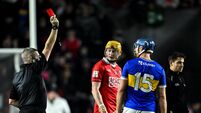Politics set aside in drive for ‘unified’ yes vote
Green leader John Gormley will also attend the meetings, as the Government seeks to avoid the disastrous in-fighting among the yes side that occurred in the first campaign.
Fianna Fáil, Fine Gael and Labour all support a yes vote, but clashed bitterly in the last campaign over who was making the greater effort and blamed each other when the treaty was defeated.













